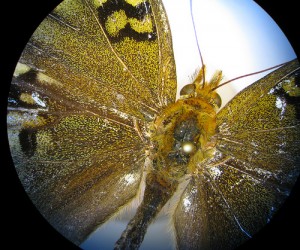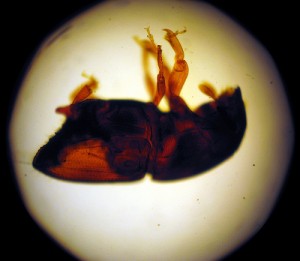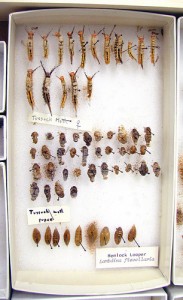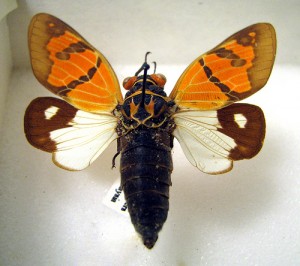The thing I like about insects is that they surreptitiously rule the world. They ravage our important natural resources. They pollinate a huge percentage of our food (not to mention providing us with coffee). They kill vast numbers of people annually, acting as the vectors of major diseases. But they also pollinate - and thus bring into existence - some of the most important pharmaceuticals in our medicinal repertoire. Insect pollination worldwide is said to have an annual value of more than $200 billion.
Insects are nature's garbagemen, eating the world's detritus - the main reason we're not knee-deep in it right now. They live everywhere on Earth- in cities, ice fields, oceans, even in you. They've existed on land and ruled in the skies long before most other animal life forms- and will most likely be here long after we are gone. They can be beautiful, gross, small, gargantuan. Insects do it all.

What better way to welcome them back than to visit the Toronto Entomologists' Association's annual Student Symposium that took place last Saturday in Ramsay Wright? Here, a number of students from different Ontario universities (Brock, Carleton, Trent, Windsor, U of T and Guelph) talked about their own entomological research projects. Insects studied included mosquitoes, crickets, mayflies, blackflies, bumblebees and some aquaticinsects. Another presenter discussed the hot (and controversial) subject of DNA barcoding.

In a nutshell, the TEA is a bug club. It's an independent scientific organization that promotes knowledge about insects and works to bring together people - professional and amateur - who are interested in entomology.
The TEA meets monthly throughout the year in Victoria College (and occasionally in Ramsay Wright) and a guest speaker usually discusses their research. The TEA organizes insect counts, which involve catching, identifying and counting insects from different orders and families. The organization then publishes a newsletter (now if colour!) three times a year that's full of information about counts, reviews of entomological literature and articles about insects.
Last but not least, the TEA organizes the annual student symposium. All the more reason to get involved, students can become TEA members free of charge upon completing a membership form.

The poster presentations, oral discussions and the general activities hosted by the TEA provide a fun way to meet people in the field, learn about current entomological research, find out more about insects in general and (most important) get excited about the upcoming invertebrate season.
- Mary

Dear Sirs,
Where in Toronto can I find the pins and boxes( chiefly the pins )to mount medium to large sized insects??
Regards,
Tracy
416.363.7081
Hi Tracy!
I’m afraid I’m not expert, but I would recommend starting at the Royal Ontario Museum. If you’re needs are specific, I think it might be worth it to order online.
Hope that helps!
Emily
Hi Tracy, you can also try Indigo Instruments, where I get pins when doing my own insect work. They deliver super fast, too, since they’re local:
http://www.indigo.com/science-supplies/gph-science-supply/insect-mounting-pins.html
Have fun, good luck!
Hello: Can someone please contact me in regards to a small black widow spider that I have in my possession. The spider arrived in a bunch of grapes from California. I would like to surrender this spider to an agency that would facilitate its growth and maturity.
Regards,
Rose Hutchinson
Hi Rose:
You might want to give the Toronto Entomologists’ Association a try. info@OntarioInsects.org